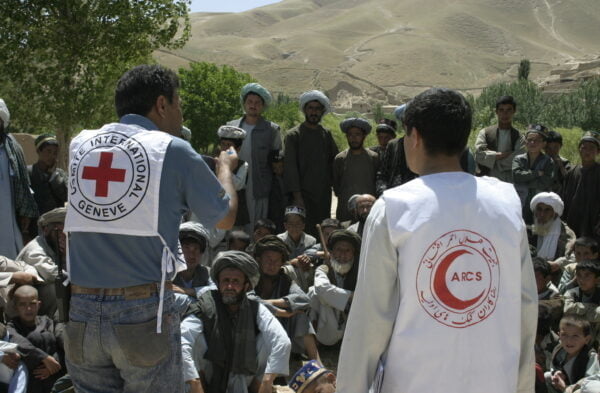Thank you, Chair. Thank you, esteemed members of the PCB. Today, despite being perceived as a language of hostility, I choose to speak in it about humanism and compassion.
The delegation of Non-Governmental Organizations takes pride in presenting its annual report titled “People Living with HIV During Humanitarian Emergencies.” We express gratitude to the numerous individuals who contributed to its preparation, especially those from key and priority populations.
The selection of the report’s theme was deliberate. If we examine a world map, we witness numerous humanitarian crises unfolding before our eyes: Afghanistan, Burkina Faso, Colombia, the Democratic Republic of the Congo, Sudan, Venezuela, Myanmar, Pakistan, Yemen, Somalia, Ethiopia, South Sudan, Ukraine, the Gaza Strip – and it is still an incomplete list. In 2023, the number of displaced people exceeded 110 million, surpassing any time since World War II. It also marked the year with the highest number of military conflicts in the last 30 years – a staggering 183.
On a personal note, this year marked a turning point for me, too, as my family and I had to leave our home country and become forced migrants due to the threat of criminal prosecution for my anti-war activities. However, I acknowledge my privilege as a white cisgender male from Europe in terms of receiving welfare and general acceptance compared to those seeking refuge from low-income, food-deficit countries.
Our Delegation wants to highlight to the PCB that there is currently no shared understanding of humanitarian emergencies encompassing both man-made and natural disasters. Acknowledging the difficulty in reaching a consensus on a unified definition at this time, we urge the Joint Program, in collaboration with relevant stakeholders, to contemplate this matter from a public health perspective as lives are at stake.
One of the most crucial messages from our report is the pressing need to develop a minimum package of interventions for people living with HIV during humanitarian emergencies. Such a package should include:
- A three-month supply of ARVs;
- Sufficient food to meet the additional nutritional needs of adults and children living with HIV;
- HIV-related health priorities (testing and treatment for hepatitis, TB, STIs; viral load; harm reduction commodities and drug dependence treatment, including access to opioid agonist therapy; prevention of vertical transmission of HIV; treatment and care for survivors of sexual violence, including rape; first aid and psychosocial support).
Other key components are establishing cash transfer mechanisms and capacity building of communities.
Our report underscores the vital role communities play in responding to the spread of HIV in humanitarian emergencies. Communities conduct needs assessments, implement community-led monitoring, and work in local languages. Communities distribute ARVs and harm reduction commodities, provide information on HIV prevention, and support survivors of gender-based violence. Communities run drop-in centers, provide psychosocial support, and help with food and shelter. Delays in aid allocation to communities can severely affect the most vulnerable and marginalized populations.
We recommend that all actors involved in assisting people with HIV in humanitarian emergencies:
- Recognize the specific health and psychosocial needs of people living with HIV.
- Integrate appropriate responses into national HIV strategic plans.
- Recognize and support the key role of communities.
- Minimize the negative impact of humanitarian emergencies on the continuum of HIV services.
We emphasize our desire for this report not to be shelved “until better times.” Therefore, we encourage the Joint Program to revisit discussions on the report’s progress in a future PCB meeting.
Two days ago, a fountain in downtown Geneva was illuminated in blue to commemorate the 75th anniversary of the Universal Declaration of Human Rights. Humanitarian emergencies underscore that human rights are often deemed worthless. We exist in a world where compiling lists of the “World’s Most Forgotten Crises,” the top 8 worst humanitarian crises of 2023, and the top 10 humanitarian crises to watch in 2024 is considered the norm. As the Russian writer Leo Tolstoy said, “Everyone wants to change the world, but no one wants to change themselves.” Our report charts a path toward that change.
Thank you.


